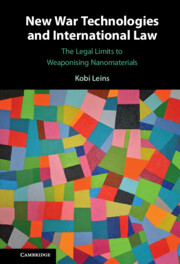
- Publisher:
- Cambridge University Press
- Online publication date:
- January 2022
- Print publication year:
- 2022
- Online ISBN:
- 9781108891974
- Subjects:
- Genetics, Life Sciences, Law, Humanitarian Law

The desire for humanity and the desire for security have co-existed as long as humans have been alive. As science has become increasingly sophisticated, so have the methods of self-defence by States. Nanotechnology is already changing warfare by increasing capabilities upon which armed forces are heavily reliant: more efficient energy storage, advanced photovoltaics, and improved military protective equipment to name a few of these developments. Some applications of nanomaterials by the military are both powerful and subtle, and have neurological and biological applications: 'devices that can infiltrate electronics and seize control at crucial moments, artificial “disease” agents that can rest harmlessly in victims' bodies until activated by an external signal'. The advance of the use or contemplation of use of these types of nanoscale applications by the military requires urgent analysis in light of existing international law, particularly in light of their potential effects on humans and on the environment.
'The book is both legally sophisticated and practically oriented, concluding with a series of recommendations for scientists, governments and armed forces.'
Professor Hilary Charlesworth - University of Melbourne, and Judge, International Court of Justice
'The book will fully inform – with sufficient detail and clarity - an expert in one field who needs or wants information in another field … to analyse future ‘means or methods of warfare’, involving any number of new technologies, in the complex and broad legal review of contemporary arms control frameworks.'
Professor Emerita Nancy Connell - Rutgers University
'Through her nuanced advocacy of existing rules and methodologies, Leins makes positive recommendations for a more cooperative future discussion across legal, social, and technical communities, bypassing the past conflicts faced in the relationship between LOAC and human rights law groups.'
Professor Robert McLaughlin - Australian National Centre for Oceans Resources and Security
'New War Technologies and International Law provides an authoritative account of the legality of using nanotechnology in war.'
Dr Filippa Lentzos - King’s College London
 Loading metrics...
Loading metrics...
* Views captured on Cambridge Core between #date#. This data will be updated every 24 hours.
Usage data cannot currently be displayed.
Accessibility compliance for the PDF of this book is currently unknown and may be updated in the future.